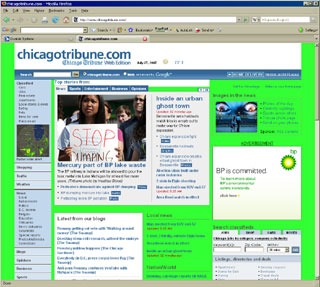Who Should Own a Domain Name?
One of the biggest challenges with establishing an Internet presence isn’t technical - it is selecting a domain name or names. Many times people have an idea on a potential name only to find it is taken. Sure, many good names are taken, but there are plenty available, and this is where I have enjoyed working with clients to select a name. In many cases, we may select a “generic” domain name, one that is not a trademark but common words that describe their products or services. An example is childproofhome.com for my client Foresight Childproofing, Inc. which is also easier to spell and remember.
There is a large aftermarket for domain names – names that have already been registered by someone else and are for sale. Some people buy names as an investment, others have names they are no longer using. We’re not talking about trademarks of products or companies, but generic names or names of people. If such a domain name is desired by someone else, they may engage with the current owner and buy it, and the cost is usually larger than the “core” cost of registering a domain name, and some names go from the hundreds to tens of thousands.
Domain names are registered on a first-come-first-serve basis. Why does the Boston Globe own boston.com? Because they were the first to register it. Though the name pertains to the newspaper in the capital city of Massachusetts, there are other cities and towns named Boston and some people have Boston as a last name. And surely there are businesses that have Boston in their title. As the Globe got it first, it is theirs. Where others may wish to have it, this is how the system was established, and for lack of a different or better system, it works.
If someone buys a domain name that is a trademarked name or a name that someone else claims should be theirs, there is a legal process that is followed through ICANN, which is the international body that oversees many aspects of the Internet, including domain names. Many people and businesses have won claims to domain names from others. Singer Madonna got madonna.com through an appeal, however the Los Angeles Angels baseball team did not get angels.com – it was determined that its South Korean owner had proper claim to the name. There is currently a case between two people named Keith Urban, one is the country music singer and the other is not as famous, but owns keithurban.com.
So who should own a domain name? It is a question that is philosophical as much as it is legal. I am presenting this information as it is something being reported more in the mainstream press, with recent articles in USA Today and the Boston Globe. And there is a law recently passed that may have more impact if its deficiencies are not glossed over by the courts. More to come.
Domain Names • Technology • (6) Comments • PermalinkA Way to Work for Google
 I saw this item posted on Spoofee.com, a site that usually just lists discounted items available on various eCommerce Web sites. But never jobs. I guess everyone will make an exception for Google.
I saw this item posted on Spoofee.com, a site that usually just lists discounted items available on various eCommerce Web sites. But never jobs. I guess everyone will make an exception for Google.
The search giant is seeking Business Referral Representatives. These are people who will canvass their neighborhood or local businesses to get their information into presumably their local search directory. More information is available on their FAQ including a link to apply.
Recently when adding some clients into Google Local, they already had listings. Some of them were correct, some were not, and some lacked details like hours of operations, logos and fax numbers. Some already had photos of the businesses! I was then able to submit revisions to the information, which required an automated callback from Google to verify it.
Where these representatives will take these few hours of work from my business, this marks a concerted effort for Google to encroach even more so on local print directories – how hard would it be to print information it already has?
Business • Technology • (0) Comments • PermalinkArticle on eCommerce featuring Mike Maddaloni
I would like to pass along an article entitled, Applying Retail Concepts to the Web, which I was interviewed for. Its author is Lisa Rummler and is published on the Web site for Certification Magazine, a periodical on technical certifications that features both the nuts and bolts of technology and the business concepts that drive the use of technology. The article is in their “CRM and e-Commerce” community. Lisa is a great interviewer and it shows in the final product.
As the article states, Dunkirk Systems has brought many companies to the Internet, both traditional brick and mortar and solely online businesses. It’s what I enjoy doing! I hope this article helps demystify the Internet for those who are either exploring eCommerce or re-evaluating what they have. And of course I welcome the opportunity to see how we may be able to help them achieve their goals.
Business • Technology • (2) Comments • PermalinkPlease Set Default Web Page Background Color
Years ago I worked on a huge Web project for a huge company where the smallest problem became a crisis. We started getting reports of a “gray screen” problem for many users when they first went into the application. In the end, we found since these users were behind a proxy server, it took a few seconds for the first page to load, and as a result the browser was displaying a blank page in the default background color, which for Internet Explorer 4 was gray.
From that point in 1999 to today, I always override the default background color of the browser – which today for both IE and Firefox is white – to lime green. Why? It is a great way to test if a default background color is set, as well as if there are any images off even a pixel, as lime green tends to stand out.
Sometimes having lime green is annoying, but is necessary for howI work. For some reason, many, many Web designers and developers neglect to set the background color on a Web page. Why? I do not know. It’s not difficult to do. In CSS you can use the background-color property for the body selector and give it a hex value for white or whatever color you are using. And for the old schoolers the bgcolor attribute for the body tag, but let’s not go there.
So who’s guilty? Too many to mention here. One example is the much-hyped "new" design for the Chicago Tribune’s Web site. Here’s what the home page looks like to me:
What I found interesting is the entire site is not background colorless. When I read Eric Zorn’s blog, it is green, but Maureen Ryan’s blog is white.
Some of you may say what is the big deal – just don’t set the background color to lime green, Mike. Not setting the background color is sloppy and incomplete coding, and when there is a change later that requires a color, then having missing colors will cause for more work. Realizing there is a default color helps in the design of sites for those who require a different color, namely those with a visual impairment.
I’ll stay on my soapbox for a bit more if anyone has any comments.
Technology • (4) Comments • PermalinkFalling Prices and Crashing Servers
 File this under not communicating with your IT department about what is going on in the company.
File this under not communicating with your IT department about what is going on in the company.
On Monday, DVD rental service Netflix announced it was cutting its prices to better compete with Blockbuster's prices and in-store redemption service. Shortly afterwards netflix.com crashed and did not come back online until late Tuesday. It was said it was not due to the power outages in the San Francisco area, and though a specific reason was not given, it was reported the Web site was being updated to reflect the price changes.
Updating prices causes an entire network of Web servers to crash? Who wrote that software? When I worked for a publicly-traded company in the past, I was always on alert from marketing and investors’ relations whenever the company would announce earnings or have an investor’s call, as people would hit our Web site for the information or links. We had sufficient capacity with out Web servers and network, but hardware can always fail. This brings back memories of the crash of Wal-Mart’s Web site last year on “black Friday” or the busiest shopping day of the year the day after Thanksgiving.
Planning for such events and having the network, hardware and software capacity can prevent such events. Sure it may be expensive, but what price for such embarrassment?
Business • Technology • (0) Comments • Permalink

